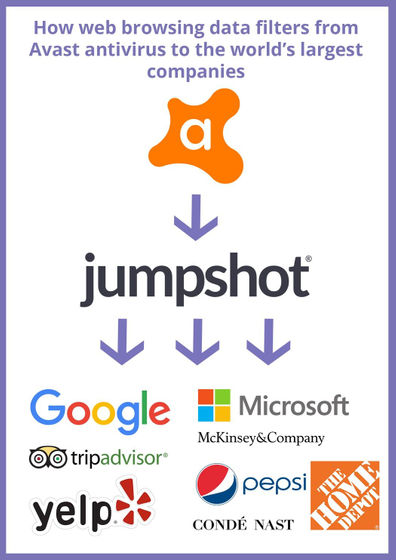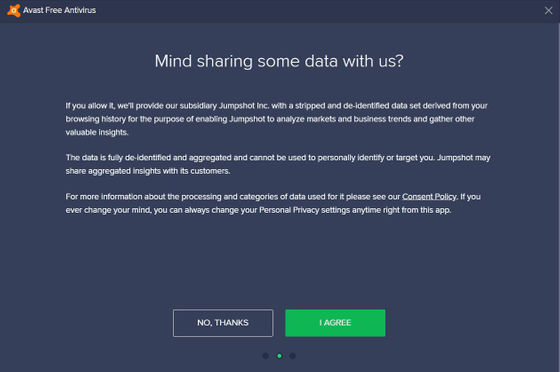Clearly that free antivirus software `` Avast '' was selling user data to Google and Microsoft

by
Avast Antivirus, which can be used for free, is a standard antivirus software with 400 million users worldwide. It has been found that security company Avast Software , which provides such Avast Antivirus, collected personal information of users and sold it to more than 20 companies.
The Cost of Avast's Free Antivirus: Companies Can Spy on Your Clicks | PCMag
https://www.pcmag.com/news/the-cost-of-avasts-free-antivirus-companies-can-spy-on-your-clicks
Leaked Documents Expose the Secretive Market for Your Web Browsing Data-VICE
https://www.vice.com/en_us/article/qjdkq7/avast-antivirus-sells-user-browsing-data-investigation
Technology news sites PC Magazine and Motherboard announced on January 27, 2020, `` A joint study found that Avast sold free antivirus software user data to other companies. '' Did. The trigger was an internal document leaked from Jumpshot, a data sales company under Avast. According to documents obtained by Motherboard, Jumpshot had converted user data collected by Avast Antivirus into various products and sold them to multiple companies.
Jumpshot's customers include Google and Microsoft, as well as a wide variety of businesses including beverage maker Pepsi , review site Yelp , home service company Home Depot , and advertising and marketing Omnicom .

In addition, data sold to these companies include search words on Google, locations and GPS coordinates searched on Google Maps, purchase history on Amazon, visits to SNS
Among the data sold as products, there is also click information when purchasing goods on the mail order site. For example, in the data below, a PC with an ID of `` abc123x '' added `` Apple iPad Pro 10.5 256GB Rose Gold '' to a cart at Amazon.com at 12:03:05 on December 1, 2019 I understand.

There is no device name just because there is a device ID 'abc123x', so it seems at first glance that it is anonymized and you do not know who the data is. However, PC Magazine states, 'Even though it is not tied to a name, email address, or IP address, each user's information is tied to an identifier called a device ID, which is matched against any activity on other sites. Is no longer anonymous because it is possible. '
Jumpshot boasts about how comprehensive its information is gathered by advertising on Twitter, 'Every search, every click, every purchase, on every site .'
THANKS to all our Year-in-Review webinar attendees and our live-tweet friends!
Attostephenkraussf And Attostevelevay For Another Fantastic Webinar. Pic.Twitter.Com/GkpWOwR3LS — Jumpshot (@jumpshotinc) December 12, 2019
Free To Reach Feel Out If You Have Any Questions Or Comments. And, KUDOS To Jumpshot'S
PC Magazine and Motherboard contacted Jumpshot's partners revealed this time, but Google and Omnicom did not respond, Microsoft also commented other than stating that `` Our company and Jumpshot are not involved '' Reject. Only a handful were able to compete.
A spokeswoman for Home Depot, one of Motherboard's respondents, said, `` We may use information obtained from third-party providers to improve our sales, products and services. Yes, we are asking such providers to share legitimate information with us, so we may receive anonymized data but cannot identify individual customers '.
`` The Yelp policy team has been asked to estimate the impact of Google's anti-competitive behavior on the local search market as part of a 2018 survey conducted by antitrust authorities, '' said a Yelp spokeswoman. In connection with this, we needed a report of high-level trend data to verify that Google was collecting web traffic, and we did a one-off deal with Jumpshot. We have not requested or accessed any possible information. '
Avast, on the other hand, states, 'Browser history collection is optional. Users can opt out of sharing information with Jumpshot at any time. Starting July 2019, we will explicitly state all data collection by Avast Antivirus. We have begun implementing an opt-in configuration, which will be completed by February 2020. '
The following is an option screen that appears when you install Avast Antivirus, asking if you agree that Jumpshot will collect anonymous browser history. However, PC Magazine states, 'It is not mentioned that there is a way to combine the data and link the collected browser history with your own identity, and that Jumpshot retains the data for three years. No. '

In December 2019, it was revealed that add-ons (extensions) released by Avast and its subsidiary AVG for Firefox had been removed from the official Firefox add-on store by Mozilla. The add-on has been re-distributed in the add-on store in January 2020, and Avast told Motherboard that `` the information collected by browser extensions has been discontinued from being shared with Jumpshot. '' I am.
Why did Mozilla remove the popular antivirus software Avast! And AVG? -GIGAZINE

by Umair Anwar
In a statement Avast sent to PC Magazine and Motherboard, 'We have a long track record of protecting your devices and data from malware. Balancing user privacy and data use. , And we take it seriously. '
'Data anonymity is almost impossible. Antivirus companies gathering information is a terrible business practice,' said Eric Goldman, professor at the Santa Clara University High-Tech Law Institute. You should protect your users from, and not expose your users to threats, 'he blamed anti-virus software that was supposed to protect information and sold the information.
◆ 13: 30 on January 30, 2020
The following statement was issued by Avast on January 29, 2020:
About some reports
https://blog.avast.com/jp/our-commitment-to-responsible-data-use
According to the statement, 'We have never sold any personally identifiable information to third parties.' 'When using Avast products, you can always allow or deny data sharing. You can change your privacy settings at any time by going to Menu> Settings> Personal Privacy. '
Related Posts:





